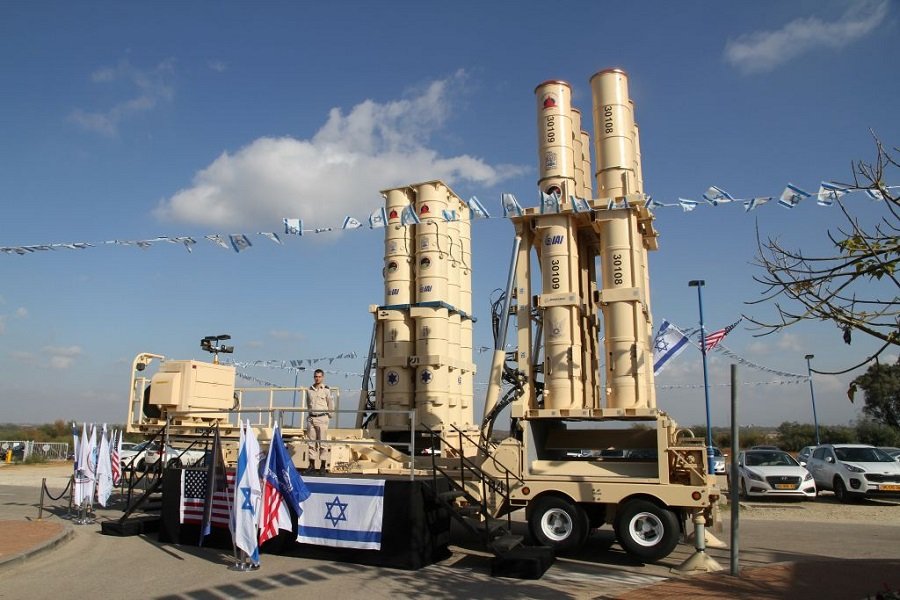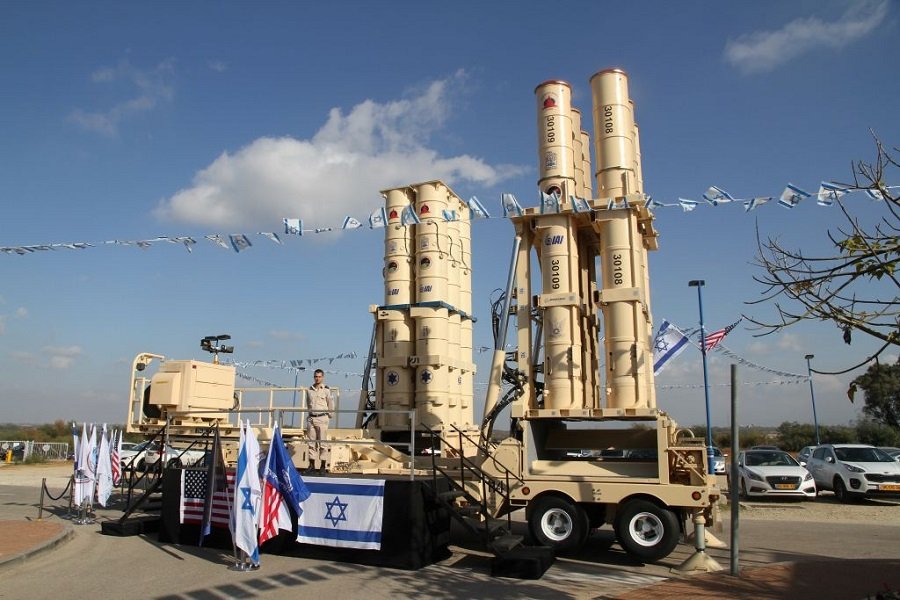Israel’s Arrow 3 Missile Crisis: 10 Days to Defend Against Iran!
Israel’s Air Defense Dilemma: The Arrow 3 Shortage
In a significant report from The Washington Post, it has come to light that Israel is facing a critical shortage of its Arrow 3 air defense missiles. This alarming development raises serious concerns about the country’s ability to intercept Iranian ballistic missiles in the near future. According to the report, Israel has enough Arrow 3 missiles to maintain its defense capabilities for only an additional 10 to 12 days. After this period, the country may be compelled to start rationing its munitions, potentially compromising its national security.
The Implications of Missile Shortages
The Arrow 3 missile defense system is a cornerstone of Israel’s defense strategy, designed specifically to intercept and destroy short- to intermediate-range ballistic missiles. Given the escalating tensions in the Middle East, particularly concerning Iran’s missile capabilities, the depletion of Arrow 3 missiles could have dire consequences for Israel. Without an adequate supply of these missiles, Israel’s ability to defend its airspace against threats could be severely hampered, making it more vulnerable to potential attacks.
Increased Tensions with Iran
The ongoing conflict between Israel and Iran has been marked by mutual hostility and a series of military confrontations. Iran’s advancements in missile technology have been a source of concern for Israel, prompting the need for robust air defense measures. The Arrow 3 system has been instrumental in countering these threats, but with the current shortage, Israel may find itself in a precarious position.
Potential Consequences for Regional Stability
The depletion of Arrow 3 missiles not only affects Israel’s immediate defense capabilities but also has broader implications for regional stability. If Israel is perceived as vulnerable, it could embolden its adversaries, including Iranian-backed groups in Lebanon and Gaza, to escalate their military operations. This could lead to increased hostilities and a potential military conflict, further destabilizing an already volatile region.
- YOU MAY ALSO LIKE TO WATCH THIS TRENDING STORY ON YOUTUBE. Waverly Hills Hospital's Horror Story: The Most Haunted Room 502
The Need for Urgent Action
Given the urgency of the situation, Israeli defense officials must take immediate action to address the shortage of Arrow 3 missiles. This could involve ramping up production, seeking assistance from allies, or exploring alternative defense solutions. The support of the United States, a key ally of Israel, will be crucial in this endeavor. The U.S. has been a significant partner in the development and funding of Israel’s missile defense systems, and continued cooperation will be vital in ensuring the effectiveness of Israel’s defense posture.
Future of Israel’s Defense Strategy
The current missile shortage highlights the need for Israel to reassess its defense strategy and diversify its air defense capabilities. While the Arrow 3 system has proven effective, reliance on a single system may not be sustainable in the face of evolving threats. Investing in additional layers of defense, including advanced radar systems and other missile defense technologies, will be essential for Israel to maintain its security in the long term.
Conclusion
The report from The Washington Post regarding Israel’s Arrow 3 missile shortage underscores a critical juncture in the nation’s defense strategy. With only 10 to 12 days of operational capability left, urgent action is required to replenish missile stocks and ensure the country’s air defense remains robust. The implications of this shortage extend beyond Israel’s borders, affecting regional stability and security dynamics. As tensions continue to rise, Israel must navigate these challenges carefully to protect its sovereignty and maintain peace in a tumultuous region.
In summary, the Arrow 3 missile shortage presents both immediate and long-term challenges for Israel. Addressing this issue will require collaboration, innovation, and strategic foresight to ensure that the nation remains secure in the face of evolving threats. As the situation develops, the international community will be watching closely, as the outcomes could have far-reaching implications for peace and security in the Middle East.

NEW:
Israel is running out of Arrow 3 air defence missles – The Washington Post
‘Israel will only be able to maintain shooting down Iranian ballistic missiles for 10 or 12 more days, then they will need to start rationing munitions’ – The Washington Post
This could… pic.twitter.com/9Q48UutDGb
— Megatron (@Megatron_ron) June 18, 2025
NEW:
Recent reports have emerged that Israel is running out of Arrow 3 air defense missiles, raising significant concerns about the nation’s ability to defend itself against Iranian ballistic missiles. According to an article by The Washington Post, Israel only has enough missiles left to maintain its defensive operations for another 10 to 12 days. After that, they will need to start rationing their munitions. This situation could have dire implications for regional security and military strategy.
Understanding the Arrow 3 Missile System
The Arrow 3 is a sophisticated missile defense system developed by Israel in collaboration with the United States. Designed to intercept and destroy incoming ballistic missiles outside the Earth’s atmosphere, the Arrow 3 is a vital component of Israel’s multi-layered defense strategy. This system not only protects Israeli airspace but also offers a deterrent against potential attacks from adversaries in the region, particularly Iran.
The Current Missile Shortage
With the news that Israel is running low on Arrow 3 missiles, there are legitimate concerns about the effectiveness of its defense capabilities. The report from The Washington Post highlights that Israel’s munitions stockpile could be critically low within a matter of days. This raises questions about how Israel will respond to potential threats, especially given the ongoing tensions with Iran. The urgency of the situation cannot be overstated; military officials are now faced with the daunting task of rationing their limited resources.
Implications of Rationing Munitions
Rationing munitions is not just a logistical challenge; it poses serious strategic risks. If Israel can only shoot down a limited number of missiles, they may be forced to make difficult decisions about which threats to prioritize. This could lead to vulnerabilities in their defense, potentially emboldening adversaries who may see an opportunity to launch attacks. The fear is that without sufficient Arrow 3 missiles, Israel’s deterrence capability could be significantly weakened, leading to increased tensions in the region.
Regional Security Concerns
The implications of this missile shortage extend beyond Israel. Iran’s ballistic missile program has been a point of contention for years, and the prospect of Israel being unable to defend itself effectively could spark a new round of conflicts in the already volatile Middle East. Regional allies and adversaries alike are closely watching how Israel reacts to this situation, and the potential for escalation is high.
Potential Responses from Israel
In light of the impending shortage of Arrow 3 missiles, Israel may need to explore alternative strategies to bolster its defense capabilities. This could involve increasing diplomatic efforts to secure additional missile supplies from allies, particularly the United States. Additionally, Israel may look into enhancing its existing defense systems or investing in new technologies to supplement the Arrow 3’s capabilities.
The Role of International Support
International support is critical for Israel’s defense strategy. The United States has historically been a strong ally, providing significant military aid and support for Israel’s defense initiatives. As the situation develops, there may be increased pressure on the U.S. government to expedite the delivery of additional missile systems or to assist in the development of new technologies to counter emerging threats. This collaboration will be essential for maintaining stability in the region.
The Future of Missile Defense in Israel
Looking forward, the challenges posed by the Arrow 3 missile shortage highlight the need for Israel to invest in its missile defense infrastructure. Developing new technologies, enhancing existing systems, and ensuring a steady supply of munitions will be crucial for maintaining national security. Israel must also address the growing threat from Iran and its allies, who continuously seek to develop their military capabilities.
Public Perception and Military Readiness
Public perception plays a significant role in how Israel addresses its military readiness. Citizens are likely to be concerned about the implications of a missile shortage, and the government will need to communicate effectively about the measures being taken to ensure their safety. Transparency regarding military strategies and the ongoing efforts to secure additional resources will be essential in maintaining public confidence in the government’s ability to protect its citizens.
The Importance of Strategic Planning
As Israel navigates this challenging situation, strategic planning will be vital. Military leaders must assess the current threat landscape and develop comprehensive plans to address potential vulnerabilities. This may involve not only improving missile defense capabilities but also enhancing intelligence-gathering efforts and fostering stronger diplomatic relations with allies. A proactive approach will be crucial in ensuring that Israel can respond effectively to any potential threats.
Conclusion
The news that Israel is running out of Arrow 3 air defense missiles is a wake-up call for military strategists and policymakers. With only 10 to 12 days of effective defense remaining, the urgency to address this situation is paramount. As Israel considers its options, the implications for regional security and military strategy will be profound. Maintaining a robust defense posture and securing the necessary resources will be essential for Israel’s continued security in a complex and dynamic geopolitical landscape.

